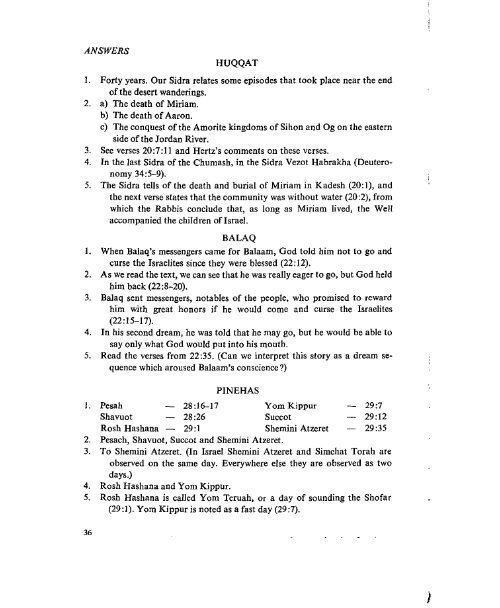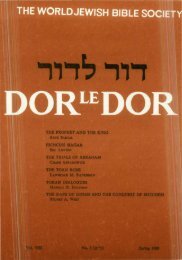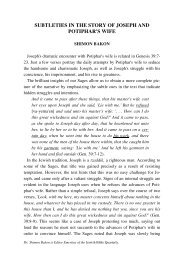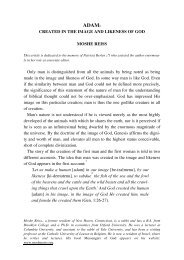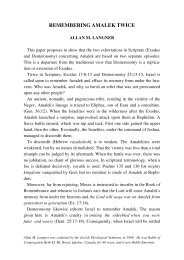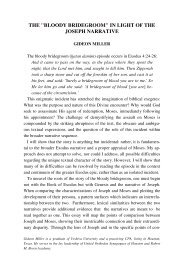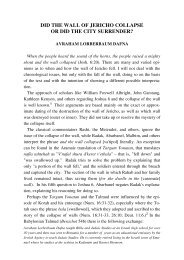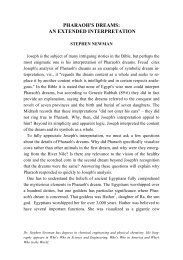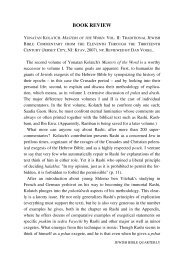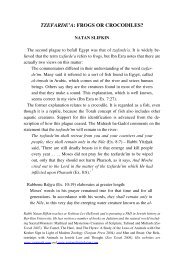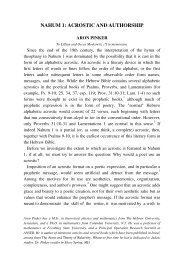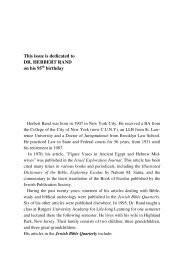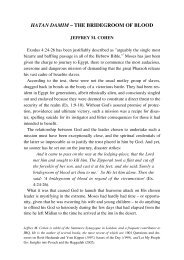ELUAH IN YIDDISH LITERATURE - Jewish Bible Quarterly
ELUAH IN YIDDISH LITERATURE - Jewish Bible Quarterly
ELUAH IN YIDDISH LITERATURE - Jewish Bible Quarterly
You also want an ePaper? Increase the reach of your titles
YUMPU automatically turns print PDFs into web optimized ePapers that Google loves.
ANSWERS<br />
HUQQAT<br />
I. Forty years. Our Sidra relates some episodes that took place near the end<br />
of the desert wanderings.<br />
2. a) The death of Miriam.<br />
b) The death of Aaron.<br />
c) The conquest of the Amorite kingdoms of Sihon and Og on the eastern<br />
side of the Jordan River.<br />
3. See verses 20:7:11 and Hertz's comments on these verses.<br />
4. In the last Sidra of the Chumash, in the Sidra Vezot Habrakha (Deuteronomy<br />
34:5-9).<br />
5. The Sidra tells of the death and burial of Miriam in Kadesh (20: I), and<br />
the next verse states that the community was without water (20 :2), from<br />
which the Rabbis conclude that, as long as Miriam lived, the Well<br />
accompanied the children ofisrael.<br />
BALAQ<br />
I. When Balaq's messengers came for Balaam, God told him not to go and<br />
curse the Israelites since they were blessed (22:12).<br />
2. As we read the text, we can see that he was really eager to go, but God held<br />
him back (22 :8-20).<br />
3. Balaq sent messengers, notables of the people, who promised to reward<br />
him with great honors if he would come and curse the Israelites<br />
(22: 15-17).<br />
4. In his second dream, he was told that he may go, but he would be able to<br />
say only what God would put into his mouth.<br />
5. Read the verses from 22:35. (Can we interpret this story as a dream sequence<br />
which aroused Balaam's conscience?)<br />
1. Pesah<br />
Shavuot<br />
Rosh Hashana<br />
28:16-17<br />
28:26<br />
29:1<br />
P<strong>IN</strong>EHAS<br />
2. Pesach, Shavuot, Succot and Shemini Atzeret.<br />
Yom Kippur<br />
Succot<br />
Shemini Atzeret<br />
29:7<br />
29:12<br />
29:35<br />
3. To Shemini Atzeret. (In Israel Shemini Atzeret and Simchat Torah are<br />
observed on the same day. Everywhere else they are observed as two<br />
days.)<br />
4. Rosh Hashana and Yom Kippur.<br />
5. Rosh Hashana is called Yom Teruah, or a day of sounding the Shofar<br />
(29:1). Yom Kippur is noted as a fast day (29:7).<br />
36<br />
)


